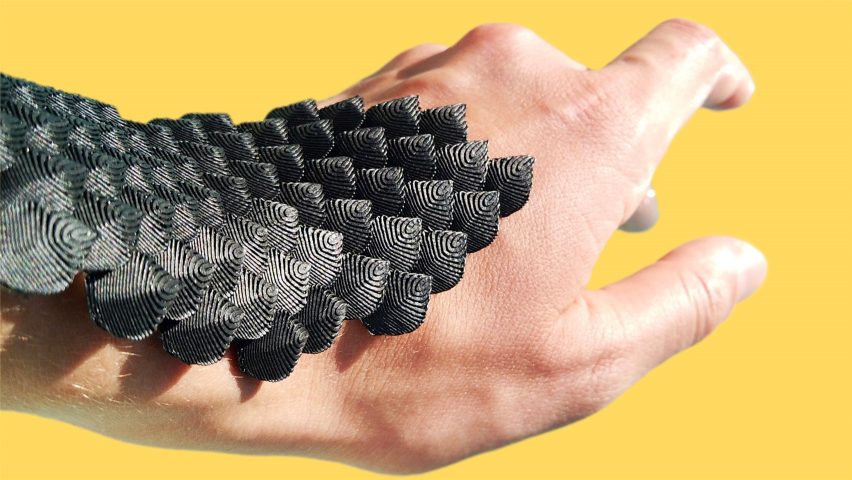Design graduate Natalie Kerres has developed Scaled, a flexible protective cast for athletes made of interlocking scales like those of a pangolin.
Kerres designed Scaled as part of the Global Innovation Design master's programme, offered jointly by Imperial College London and the Royal College of Art.
The wearable could be customised for individual sportspeople looking to protect and support a vulnerable body part such as the spine or wrist.
Kerres studied the scales of lizards, fish and pangolins – a mammal covered in scales made of keratin that can curl up into a ball when threatened.
The designer worked on a system that could apply this natural protective system to athletes, helping to rehabilitate joint injuries. Scaled could also prevent injuries in the first place, by acting as a shock absorber and preventing hyperextension.
Traditional casts or braces are designed to hold joints in place also restrict the wearer's movement and can cause discomfort. Scaled is intended as a solution to this problem, as the wearable can bend with the athlete's body.
Kerres' bespoke design involves using a parametric algorithm to determine the exact shape of the interlocking scales so that the cast exactly fits the body of the person wearing it.
Scaled has been granted funding by a programme called MedTech SuperConnector (MTSC), which will help develop the health product and scale it for commercial use.
As the patent is still being filed, Kerres has to keep details of the materials and technology under wraps.
"We are investigating lightweight materials that are sustainable and user friendly, but still deliver the necessary properties to provide the desired performance," Kerres told Dezeen.
"Depending on the activity, sports protection, performance enhancement or rehabilitation, the scale structure will function as a wearable," she added. "Details on how it is attached to the body cannot be disclosed in this stage of development."
Kerres and MTSC hope to bring Scaled to market by 2021.
Other wearable designs created by recent design graduates include a mouth brace that allows the wearer to communicate with a computer using just their tongue and a "surveillance-proof" wearable device that could replace facial recognition.

